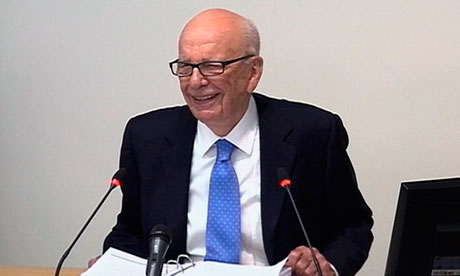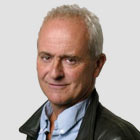Rupert Murdoch gives away more than planned at Leveson inquiry
The denials never shifted but, under careful questioning from Robert Jay QC, the tycoon made some serious concessions

Rupert Murdoch often departed from the script in his evidence at the Leveson inquiry. Photograph: Reuters
At one point in his evidence, when he was trying to explain how he dealt with politicians, Rupert Murdoch volunteered: "I'm not good at holding my tongue." It must drive his advisers crazy.
The plan clearly was for Castle Murdoch to be defended with well-constructed walls of obdurate denial, reinforced by occasional bouts of forgetfulness. Certainly, the denials never shifted – and these were big, tough denials: "I've never asked a prime minister for anything in my life … We have never pushed our commercial interests in our papers … I don't know many politicians."
However, in the event, Robert Jay QC kept piercing small gaps in Murdoch's defences. This was partly because Jay had gathered up a prodigious supply of facts, which he fired like slingshot at the castle walls – and partly because the old mogul likes to talk. Jay didn't break in and ransack the place, but he did some damage.
Sometimes the wounds were nothing more than dents in Murdoch's standing, as he acknowledged that it might well be true that he had once listened to Ken Livingstone on television denouncing the "lies and smears of the media" and that he had then declared drunkenly to a roomful of people, "That's me!" Or that he might well have qualified his early approval for Tony Blair by adding that they were not yet ready to take their pants down together.
But sometimes, in the detail behind the denial, he conceded substantial ground. His underlying problem was that he was not listening to Jay and failed to see the subtlety of the allegation that faced him.
Murdoch kept denying that he made deals with politicians, ie, that he simply offered them the support of his paper in return for favours to his business. But Jay suggested: "It operates at a far more sophisticated level, doesn't it?" and went on to quote the reported words of the former Australian prime minister Paul Keating: "You can do a deal with him without ever saying a deal is done."
In the case of Murdoch's relationship with Blair, Jay quoted Murdoch's former editor, Andrew Neil, that there had been "an implicit understanding – never openly talked about between the two men – but an understanding nevertheless".
Murdoch duly put up his well-rehearsed denial – "I never asked Mr Blair for anything, nor did I receive any favour" – and then proceeded to volunteer that he had been in the habit of seeing Blair two or three times a year, as though that were an annual average for most voters to see a national leader.
He described how he had once spent an afternoon at Chequers, telling Blair how much he opposed Britain joining the euro, as though the prime minister had nothing better to do.
To this extraordinary degree of access, he boldly added that he does indeed direct the editorial line of the Sun on major issues, including questions about Europe. And, once again failing to hold his tongue, he went right ahead and admitted what this would mean to a man like Blair: "If any politician wanted my views on major issues, they only had to read the Sun." The Sun relentlessly reinforced the anti-EU message.
Murdoch continued to deny that Blair had ever done anything for him, but then conceded that Blair had "gone the extra mile for him" over European policy, to the point where he had acceded to the Sun's demand that the government should agree to hold a referendum before accepting the new EU constitution.
And Blair had done something very similar by ensuring Britain maintained tough anti-union laws and then underlined the point with an article in the Sun, following which the two men had enjoyed dinner together. Murdoch agreed it was possible he had congratulated Blair on his position.
Similarly, Jay quoted Murdoch's former confidant, Woodrow Wyatt, who was close to Margaret Thatcher and who recorded in his diary that he had once told Murdoch: "Margaret is very keen on preserving your position. She knows how much she depends on your support. Likewise, you depend on her." Murdoch produced his standard denial – "I didn't expect any help from her, nor did I ask for any" – and then found himself accepting that, while the Sun supported her, she had delivered a series of decisions which looked really very helpful indeed, including allowing him to buy the Times and the Sunday Times without referring his bid to the Monopolies and Mergers Commission. She also exempted BSkyB from the regulations in the 1990 Broadcasting Act.
With Gordon Brown and David Cameron, he kept closer to the script but, even so, he caused unnecessary trouble.
He denied discussing the BBC licence fee with Cameron. Enough said. Talking to a prime minister about the licence fee might suggest he had some commercial motive. But then his tongue added: "I wasn't interested in the BBC licence fee. I had been through that with previous prime ministers, and it didn't matter. They all hated the BBC, and they all gave it whatever it wanted."
He set the record straight on Kelvin MacKenzie's claim that Brown had reacted to the Sun's endorsement of the Tories in September 2009 by phoning him and roaring down the phone for 20 minutes. That was "a very colourful exaggeration", he said. Enough? No. He went on to quote a version of the call which was highly likely to provoke a response from Brown, who duly issued a statement saying that Murdoch was wholly wrong and should have the good grace to correct his account.
As he left the inquiry for a break, his tongue was still rolling. Dan Sabbagh, the Guardian's head of media, heard him grumble to his advisers about Lord Justice Leveson: "Let's get him to get this fucking thing over with today." If only they could. Murdoch resumes his evidence on Thursday morning.
The plan clearly was for Castle Murdoch to be defended with well-constructed walls of obdurate denial, reinforced by occasional bouts of forgetfulness. Certainly, the denials never shifted – and these were big, tough denials: "I've never asked a prime minister for anything in my life … We have never pushed our commercial interests in our papers … I don't know many politicians."
However, in the event, Robert Jay QC kept piercing small gaps in Murdoch's defences. This was partly because Jay had gathered up a prodigious supply of facts, which he fired like slingshot at the castle walls – and partly because the old mogul likes to talk. Jay didn't break in and ransack the place, but he did some damage.
Sometimes the wounds were nothing more than dents in Murdoch's standing, as he acknowledged that it might well be true that he had once listened to Ken Livingstone on television denouncing the "lies and smears of the media" and that he had then declared drunkenly to a roomful of people, "That's me!" Or that he might well have qualified his early approval for Tony Blair by adding that they were not yet ready to take their pants down together.
But sometimes, in the detail behind the denial, he conceded substantial ground. His underlying problem was that he was not listening to Jay and failed to see the subtlety of the allegation that faced him.
Murdoch kept denying that he made deals with politicians, ie, that he simply offered them the support of his paper in return for favours to his business. But Jay suggested: "It operates at a far more sophisticated level, doesn't it?" and went on to quote the reported words of the former Australian prime minister Paul Keating: "You can do a deal with him without ever saying a deal is done."
In the case of Murdoch's relationship with Blair, Jay quoted Murdoch's former editor, Andrew Neil, that there had been "an implicit understanding – never openly talked about between the two men – but an understanding nevertheless".
Murdoch duly put up his well-rehearsed denial – "I never asked Mr Blair for anything, nor did I receive any favour" – and then proceeded to volunteer that he had been in the habit of seeing Blair two or three times a year, as though that were an annual average for most voters to see a national leader.
He described how he had once spent an afternoon at Chequers, telling Blair how much he opposed Britain joining the euro, as though the prime minister had nothing better to do.
To this extraordinary degree of access, he boldly added that he does indeed direct the editorial line of the Sun on major issues, including questions about Europe. And, once again failing to hold his tongue, he went right ahead and admitted what this would mean to a man like Blair: "If any politician wanted my views on major issues, they only had to read the Sun." The Sun relentlessly reinforced the anti-EU message.
Murdoch continued to deny that Blair had ever done anything for him, but then conceded that Blair had "gone the extra mile for him" over European policy, to the point where he had acceded to the Sun's demand that the government should agree to hold a referendum before accepting the new EU constitution.
And Blair had done something very similar by ensuring Britain maintained tough anti-union laws and then underlined the point with an article in the Sun, following which the two men had enjoyed dinner together. Murdoch agreed it was possible he had congratulated Blair on his position.
Similarly, Jay quoted Murdoch's former confidant, Woodrow Wyatt, who was close to Margaret Thatcher and who recorded in his diary that he had once told Murdoch: "Margaret is very keen on preserving your position. She knows how much she depends on your support. Likewise, you depend on her." Murdoch produced his standard denial – "I didn't expect any help from her, nor did I ask for any" – and then found himself accepting that, while the Sun supported her, she had delivered a series of decisions which looked really very helpful indeed, including allowing him to buy the Times and the Sunday Times without referring his bid to the Monopolies and Mergers Commission. She also exempted BSkyB from the regulations in the 1990 Broadcasting Act.
With Gordon Brown and David Cameron, he kept closer to the script but, even so, he caused unnecessary trouble.
He denied discussing the BBC licence fee with Cameron. Enough said. Talking to a prime minister about the licence fee might suggest he had some commercial motive. But then his tongue added: "I wasn't interested in the BBC licence fee. I had been through that with previous prime ministers, and it didn't matter. They all hated the BBC, and they all gave it whatever it wanted."
He set the record straight on Kelvin MacKenzie's claim that Brown had reacted to the Sun's endorsement of the Tories in September 2009 by phoning him and roaring down the phone for 20 minutes. That was "a very colourful exaggeration", he said. Enough? No. He went on to quote a version of the call which was highly likely to provoke a response from Brown, who duly issued a statement saying that Murdoch was wholly wrong and should have the good grace to correct his account.
As he left the inquiry for a break, his tongue was still rolling. Dan Sabbagh, the Guardian's head of media, heard him grumble to his advisers about Lord Justice Leveson: "Let's get him to get this fucking thing over with today." If only they could. Murdoch resumes his evidence on Thursday morning.

No comments:
Post a Comment